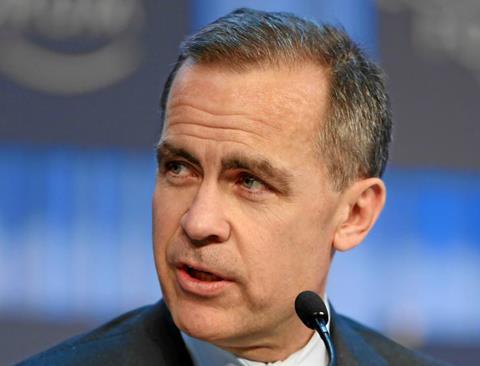As three of the largest UK open-ended real estate funds halt redemptions, Mark Carney, governor of the Bank of England, has warned that commercial property is a key risk for the British economy after the shock vote to leave the EU.

Carney said that real estate valuations have become stretched and that the economic risks caused by the referendum have 'begun to crystallise'.
The only positive note in his otherwise sombre statement was that UK banks' exposure to the commercial property is 'quite manageable', so there will not be a re-run of the financial crisis and related problems. 'We are in a very different world to 2007 and 2008,' Carney said.
Aviva Investors suspended its £1.8 bn UK property fund on Tuesday afternoon, followed shortly afterwards by an announcement from M&G Investments that it was suspending withdrawals from its £4.7 bn Property Portfolio. Standard Life was the first to act, closing its £2.9 bn open-ended real estate fund to redemptions on Monday.
Aviva said that, 'extraordinary market circumstances, which are impacting the wider industry, have resulted in a lack of immediate liquidity in the Aviva Investors UK Property Trust. Consequently, we have acted to safeguard the interests of all our investors by suspending dealing in the fund with immediate effect.'
The fear of a post-referendum recession in the UK and consequent property crash had led to a sudden surge of investors' requests to redeem their investments. The suspension will now allow Aviva time to sell assets and have enough liquidity to allow investors to redeem their holdings, the company said.
Aviva's announcements has sent the pound to a new 31-year low against the US dollar, while the share prices of property companies and fund managers fell sharply on the London Stock Exchange on Tuesday.
M&G then announced a temporary suspension of trading in the shares of the M&G Property Portfolio and its feeder fund. In a statement, M&G said, 'Investor redemptions in the fund have risen markedly because of the high levels of uncertainty in the UK commercial property market since the outcome of the European Union referendum. Redemptions have now reached a point where M&G believes it can best protect the interests of the funds' shareholders by seeking a temporary suspension in trading.'
M&G said that it would use the breathing space to raise capital levels in a controlled fashion, and that the suspension would be reviewed every 28 days.
On Monday, Standard Life announced its decision to close the third-largest in the UK for retail investors, after a sudden increase in outflows. Standard Life, like Aviva, cited 'exceptional market circumstances' and said it would sell assets to raise cash.
The fear now is of a domino effect. 'It is probably only a matter of time before we see other funds follow suit,' said Laith Khalaf, analyst at Hargreaves Lansdown. 'The problem these funds face is that it takes time to sell commercial property to meet withdrawals, and the cash buffers built up by the managers have been eroded by investors heading for the door, both in the run-up to the EU referendum and in the aftermath.'
The supply of commercial properties on the market will now increase suddenly, Khalaf said, and this is likely to put downward pressure on prices. 'The potential impact of a high-profile liquid fund suspending redemptions should not be underestimated, particularly given the uncertain environment,' said Emma Bewley, head of funds at Connection Capital in London.
The BoE's Financial Stability Report today warns of a 'future marked adjustment in commercial real estate prices', following the sharp falls in the share prices of real estate investment trusts over the last few days.
Rplan.co.uk, the online investment platform, has claimed that UK retail investors are pulling out of property and UK equity funds and switching into global and Japan equities. Am analysis showed that the number of trades on the rplan.co.uk platform was up 175% over the weekend following the Brexit vote versus the previous weekend, and 76% of withdrawals was from property funds and 22% from UK equity funds. The volume of switching between funds was 4.5 times higher than the previous weekend.
The sectors most bought overall included global equities (56%), Japan equities (20%), UK equities (16%) and North America equities (5%).
Stuart Dyer, rplan.co.uk’s chief investment officer, commented: 'UK investors' fears about the prospects for property are striking. Clearly, there are worries that property would be affected by a possible economic downturn and the withdrawal of foreign investors.
'But investors should not be too hasty in making decisions about the consequences of Brexit. Property and other asset classes have their roles to play in a balanced portfolio invested for the long term. Diversification helps to reduce both the impact of volatility and risk.'
PropertyEU reported at the beginning of the week that many buyers are invoking pre-arranged 'Brexit clauses' to pull out of commercial property deals in London. In the last few days office and retail deals worth at least £850 mln (over €1 bn) have collapsed or are under review because of post-referendum jitters.










